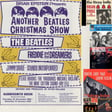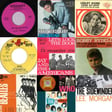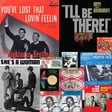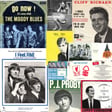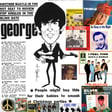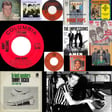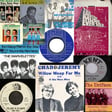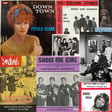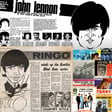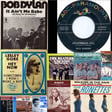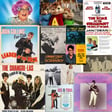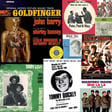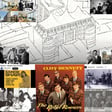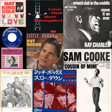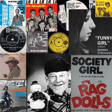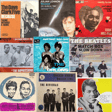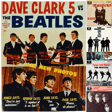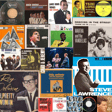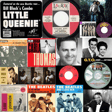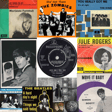Become a Creator today!Start creating today - Share your story with the world!
Start for free
00:00:00
00:00:01

July 1964 (side B)
We start in on the American charts for July of 1964. Capitol decides to "out-VJ" the VJ label, while Arthur Fiedle and the Hollyridge Strings invade the charts as well. All this and more! We keep on playing those instrumental Beatles covers for-ever! #MadeonZencastr
Recommended
Transcript
The Beatles' Motivational Mantras
00:00:00
Speaker
The Beatles had this chant, John Paul and George, and probably then Stuart and Pete had this chant when things weren't going well, which in their world wasn't very often because mostly it was an upward trajectory, but nonetheless, sometimes you they would have a bad night or the gig didn't work properly or the amps broke or whatever. I say, where are we going, fellas? And they'd go to the top, Johnny. And I'd say, where's that, fellas? And they'd say to the top of most of the papamos. And say, right. And we'd all sort of cheer up. Here we goin', Johnny. Straight to the top, boys. Oh, yeah? Where's that? The top or most of the top or most?
Introduction to Billboard Charts Discussion
00:00:59
Speaker
Welcome to Side B, the first two weeks of the U.S. Billboard charts for July of 1964. I'm Ed Chin. I'm Kid O'Toole. And I'm Martin Cubel. All right, we start with the week of the holiday, the week of July the 4th, 1964. At number one is a suitable song, I Get Around By The Beach Boys, and a good, solid American song. Damn straight. Love that song. at number 19 still hanging around is Love Me Do. Boy, it seems like it's been on the charts a long time. Well, we had to have at least one Beatles record hanging on until the next one. And well, as we saw in the British charts, the next one is just around the corner. That's right.
The Premieres and Chicano Rock Influence
00:02:01
Speaker
At number 37, a song called Farmer John by the Premieres. It's a very garage band style recording. It sounds in many ways like Louis Louis, but it's not really Louis Louis. They were on Bandstand in August and you can see them wearing the collarless jackets and doing the shadows choreography. You got the drummer singing. It's more or less what you might expect.
00:02:54
Speaker
And it's not exactly an accident that they sound like the Kingsman because, first of all, this is an early example of Chicano rock. They were formed in 1962 in San Gabriel, California, by Mexican-American brothers, Lawrence Perez, who played the guitar, and John Perez, who played drums. And they were discovered by Billy Cardenas, who managed and produced other Chicano bands in the East Los Angeles area. and they won opening acts, slots for artists such as Johnny Guitar Watson and Chris Montez, who we've talked about many times on this show. And so, following the Kingsman success with Louis Louis, Cardenas suggested that the premieres record a similar song, Farmer John. This sounds like it was live, and it claimed to have been recorded, quotes, live at the Rhythm Room in Fullerton, California.
00:03:50
Speaker
It was not. It was recorded at a small studio in Hollywood with overdubbed party noises provided by the girls of the Chevelis Car Club who had been invited to the studio. So it was not really live, but we've seen that many times on this show as well. Definitely sounds like Louie Louie with the chord changes, the sloppy production. It's a fun party record, but I'd say that's about it. I think it's pretty badly recorded. You can barely hear the singers, which isn't a problem. But it's kind of interesting in that it's an early example of Chicano rock.
00:04:28
Speaker
And they did end up opening and touring nationally with artists such as The Crystals, Gene Pitney, Rolling Stones, The Kinks, and the Dave Clark Five.
Billy Cardenas and Touring with The Beatles
00:04:38
Speaker
Now, Billy Cardenas would also present the world with Cannibal and the Headhunters, who would also be on the Beatles 1965 tour. A year later, they had a hit version, not the hit version, of Land of a Thousand Dances. Now, that's a good record. I wish the overdubbed crowd, quotes, I wish they would have been a lot further down in the mix, because you can't really hear what's going on that much. I mean, it's fast paced, blimey, that drummer must have blisters on his fingers by the end of it. um Yeah, you can't really tell what the guy's singing. But then again, does it really matter? It's all about the vibe that's going on there, I think more than the actual song itself. It's sort of a party record. It's garage rock and it is very much Kingsman inspired as you say. More than a little. Although the lyrics are ever so slightly more intelligible here. Yes.
00:05:37
Speaker
At number 72, I Can't Hear You by Betty Everett. It's a Goffin' and King song. It's got a really great groove. The lead vocal is really nice. The male backing vocals are too far up in the mix. The horns are played well and this is actually recorded really well.
00:06:20
Speaker
It's got kind of a Motown feel to it, not quite as energetic as a Motown record would be. I like the beat and the horns and the hand clap part of it. I kind of agree with you, Ed. The backing vocals were way too high up in the mix. And I didn't love that they were male backing vocals. I think it would have been better if they were female, a bit more of like a girl group backing vocals. or maybe a mix, that might have been interesting. Yeah, I would have liked to have heard some female vocals in there too, because just the male vocals, I don't know, it just sounded curiously flat to me. I didn't think these were Goffin and King's best lyrics, they just weren't very catchy. I didn't really hear a hook here, but Betty Everett, terrific vocalist. Had a bit of a Motown groove to it, but yeah, those backing vocals kind of threatened to overtake it and not in a good way.
00:07:14
Speaker
Yeah, I love the musicians, what they're doing in the background. Not fond of the vocals, like you said. I mean, I originally just thought females would have fitted, but what Ed said about a mix of both, yeah, that could have worked, I suppose, but absolutely pulled back because they're just too out there. But her voice is amazing on this. Great singer.
Arthur Fiedler and The Beatles' Influence on Classical Music
00:07:35
Speaker
At number 74, a cover of I Want to Hold Your Hand by Arthur Fiedler and the Boston Pops Orchestra. Fiedler was known to be a big fan of the Beatles, and he would in fact appear in front of the Beatles at Shea Stadium when the film finally showed up on ABC. This is a really interesting version of it. It's miles away from the Musaki, Holly Ridge strings versions. It's a good arrangement. This was arranged by the arranger for the Boston Pops, Richard Heyman. Heyman had a number of hit singles, including Ruby from the 1952 film, Ruby Gentry, starring Jennifer Jones and Charlton Heston. Heyman's arrangement featured himself as a harmonica soloist. Over a lengthy career, he created musical arrangements for more than 50 artists and entertainers, including Barbara Streisand, Bob Hope, Liza Minnelli, and Olivia Newton-John.
00:08:33
Speaker
oh Interesting. The flip of this single was another version of Hello Dolly! Another one!
00:09:10
Speaker
This is definitely an example of how the Beatles were being taken more and more seriously, that someone like Fiedler and Boss and Pops were covering Beatles songs. They found them worthy of re-ranging and recording on their own. Of course, also a sign that established acts were cashing in on their popularity, let's face it, and covering their songs to attract a bigger audience for themselves. I thought this was a pleasant cover. I don't think I liked it as much as you did it. I thought it was kind of bordering on music for me. I just didn't find it very interesting on my end. The Hollywood Strings version, that's music. That's worse. This has a little more life to it, but I just didn't find this all that interesting. Hollywood Strings, way worse. I agree. Yeah. I find it interesting that as an example that more from the classical world, we're starting to take one in a McCartney composition seriously and covering them both to show their respect, but also let's face it, they said to cash in and attract wider audiences.
00:10:19
Speaker
Yep, it's definitely a step up from the Hollywood String song that we're going to come across later. And incidentally, I actually thought when I had the Hollywood Strings one, and would that be in the dictionary of Muzak? But this one is okay. It's a step up from there. But, dear me, did they have to end it with a Shaven and Air cut at the end?
00:10:50
Speaker
Oreny. Yeah. A slightly fun picture sleeve, a caricature of Arthur Fiedler waving a baton in a beetle wig. So, you know, hey. And he got some criticism from other classical artists for his embrace of popular music, that he would rearrange popular music by the Beatles and other artists, but he was very successful. Well, as I say, he got some blowback from his appearance in Beatles at Shea Stadium. Wouldn't be surprised, but I think he was smart. One of the hallmarks of Arthur Fiedler was a a certain musical eclecticism. What do you suppose prompted that? Just ah kind of an omnivore sort of an appetite for all things musical? He was a pioneer in crossover. I mean, before the word was even used. I mean, think of what he did. He did the Beatles album. He did Elvis. Many of the classical purists, the elitists, were appalled that he would do that. I mean, after all, you can't you can't follow
00:11:50
Speaker
classical music with Beethoven and Mozart, with Elvis and Beatles. I mean, that is an inflamia, as we say in Italian. But, you know, Fiedler had that, what the late George Frazier used to call Duende. He had the ability to bring huge masses of people into what he believed was good music. You know, there's good music and there's bad music. And I'm not going to continue to put this other stuff down because it's popular. In a sense, he introduced So many people who crossed over and heard classical music as well as blending in into the music of the entire time. He was a ah record company's dream in terms of branding the Boston Pops, you know, for what they are. America's Orchestra.
Rolling Stones' Transition to Original Compositions
00:12:31
Speaker
At number 80, You're My World by Cilla Black, which we've covered on the UK side. At number 81, Tell Me You're Coming Back by The Rolling Stones, a slightly lesser known stone song. It's a ballad, a nice mick lead vocal. Charlie is hitting the drums hard. A little bit of Dave Clark Five again. Nice piano. It's well recorded. This was the first A-side single written by Jagger and Richards to be released, although not in the UK. The single would reach number 24 here in the States becoming their first top 40 hit here and the top 40 in several other countries. Many people might know it because it does appear in the 1973 Martin Scorsese film Mean Streets. Okay. I know you find it hard
00:13:24
Speaker
To reason with me This time you're different Darling, you're safe You gotta Tell me you're coming Back to me You gotta Tell me you're coming Back to me You gotta Tell me you're coming Back to me You gotta Tell me you're coming Back to me And Mick Jagger said in an interview with The Rolling Stone in 1995 that this song was kind of a turning point for them. He said, Tell Me is very different from doing those R and&B covers or Marvin Gaye covers and all that. There's a definite feel about it. It's a very pop song as opposed to all the blues songs and Motown covers, which everyone did at the time.
00:14:15
Speaker
And I would say this does have a different sound. It's a bit poppier, although I think mixed voice does still have that bluesy sound to it. Has a bit more of an acoustic feel with Keith's 12 string rhythm guitar. Yeah. Almost draws a little more from a, to me anyway, a little more of a Mersey beat. kind of sound, but it does have some heavy drums from Charlie Watts, which I think is an interesting choice for essentially a ballad. It's not my favorite Stone song, but it's interesting in that, you know, it does signal a departure from their earlier sound and further example of Keith and Mick's songwriting and how they were starting to develop their own songwriting and their own style.
00:15:02
Speaker
Yeah. But not only that, it also shows an early example of how each member of the group works their magic into performance of a Jagger and Richards song, because the 12 string by Keith is lovely and in there. but But you also see how incredible a musician that Brian Jones in the group was, as well as being able to just give a song what it needs as well because his electric guitar in this works really well, as does the tambourine playing that he puts in there as well. It showed how perfect he was that trying to bring out the best of the Jagger and Richards writings.
00:15:40
Speaker
Agreed. Now this record was recorded in the original Regent Sound. Mick said that Keith was playing 12-string and singing harmonica into the same microphone as the 12-string. We recorded it completely on the west end at the studio called Regent Sound. Regent Sound would expand in 1966. to a second larger studio known as Studio A on Tottenham Court Road. This studio would be home to recordings by Genesis, the Bee Gees, and Paul McCartney who recorded Fixing a Hole in just over a day because Abbey Road was all booked up. Fixing a hole in one day.
00:16:25
Speaker
Wow.
Del Shannon's 'Handyman' and Musical Comparisons
00:16:26
Speaker
Number 85, Del Shannon's cover of Handyman. It's pretty good, but that Palisades Park organ break in the middle hurts the song a little bit. Deduct some points for that. He does still seem to be trying to do a bit of the Frankie value alike in his vocal. Better than some of the other Del Shannon songs we've had, good drums and good guitar. It's not in the league with either the Jimmy Jones original or the James Taylor cover, but it's still pretty good. Tell all your friends, they'll come running to me.
00:17:03
Speaker
I want to say I'm busy 24 hours a day. I push broken butts, I know I really care.
00:17:29
Speaker
Del Shannon singing on this fine, but yes, once again, the organ. I didn't care for that. I almost felt like the organ was trying to sound like the section of Runaway. I thought, wait a minute. Was this like a leak from Runaway? It worked from Runaway. Let's do it again. Yeah, exactly. I mean, that's what it sounded like. Joe Shannon's vocal on this is fine, but I much prefer, as you said, at Jimmy Jones' 1960 version or James Taylor's kit in 1977. Little Beatles connection here, Peter Asher produced and played the congas on. Cool. It's all right, but it's not top tier Dell. No. And as we mentioned before, there's a Conway Twitty version out there, which I like quite a lot.
00:18:19
Speaker
I'll have to listen to that I didn't know that. Cool.
Motown's Vibrant Sound with The Marvelettes
00:18:59
Speaker
At number 88, You're My Remedy by The Marvelettes. It's a smoky song. It starts out slow, but it does pick up Motown Junkies. Savage it, but then they also love it quite a bit. Shout out to Motown Junkies. That's a great blog. This one starts out in most unpromising fashion. A clunky, unlovely piano riff strongly reminiscent of the similarly unvarnished, as long as I know he's mine, which we have covered. all together too heavy and ugly for a group capable of such delightful magic. Then a harsh strident Wanda Young, who Smokey was using on more and more Marvelettes records, cuts as lead singer in place of Gladys Horton. She barks out the first couple couplets in blaring, charmless fashion.
00:19:44
Speaker
But wait! Hold the phone, Marvelettes fans! Here comes a gallant cavalry charge of horns, a bevy of handclaps, a sea of well-judged call-and-response backing vocals, a proper groove! This group really are the female temptations. The longer the record goes on, the better it gets. The entire final half-minute of the record is made up entirely of that chorus on a seemingly endless loop, getting louder and more boisterous each time. Smokey and the Frank Brothers throw more and more things into the pot that weren't there before. Chorus-skating saxophone with a very Supremes-like instrumental middle-eight. A jangling guitar part. Robinson was smart enough to reclaim this for use on The Miracle's Next Single. That's what love is made of. Great towering waves of organ. Good organ. Good organ. Good, good organ. Yes.
00:20:53
Speaker
And I agree with most of that. It does start out slow and it does pick up as the record goes and it becomes a pretty good record by the end of it. When the song started, I thought, oh, I don't know. Wasn't sure if I was going to like it. And it's still not one of Smokey's best compositions.
00:21:21
Speaker
But yes, definitely gets better as it goes along. It's it slow starting. Once it starts getting to that calm response section, the backing vocals really starts hitting its groove and the funk brothers come in, then it starts really getting into that marvelous. sound, and it really sounds a lot better. So I still would definitely not call this top tier marblets or smoky, but you have to stick with it. Get past that first minute. Yep, exactly. When you press that first minute, you're in. Yeah. I agree. The last minute of this record is great, but it has to build to it. you The lyrics are a bit wishy-washy in places, but other than that, like you said, that last minute is fantastic.
00:22:08
Speaker
At number 90, The Mexican Shuffle by Herb Alpert's Tijuana Brass Band.
Herb Alpert's Catchy Commercial Tunes
00:22:15
Speaker
This was known at the time because it was used in a commercial for the T. Berry Shuffle, horns, guitars, maracas, and mellow drumming. It doesn't really sound like a hit record to me, but it's good enough to make you stop, smile, and bop along too.
00:22:35
Speaker
Clark T. Berry Gum presents the T. Berry Shuffle. um are
00:22:53
Speaker
um
00:23:02
Speaker
um have a little flood dry fart teaberry gun I thought this sounded familiar. I don't know if I've heard it in that commercial, but I was racking my brain trying to think if I'd heard it somewhere else, a movie or or something. but It's a fun enough track. It sounds very much of its time. I mean, it does have that 60s kind of sound to it. And it was written by A and&M house songwriter Saul Lake, who also wrote The Lonely Bowl and many other Tijuana brass hits.
00:23:39
Speaker
And it's fun enough. I'm not sure how big a hit this was if it went top 10. I don't like it as well as the lonely ball or others. But yeah, as you said, it's kind of fun to tap your foot to, you know, other than that, don't think it's as outstanding as some of his other stuff. Yep. Bouncy, fun. I must have enjoyed it because my foot was tapping while I was listening to it. Doesn't get boring because it's not that long. I still find it you know strange looking back to a time when instrumentals were so prevalent in the charts.
00:24:12
Speaker
Good point. Yeah, there are a number of them and you you don't see that much anymore. Yeah, really through the early 70s, we would see instrumentals still chart at least reasonably highly. At number 93, All My Loving by the Holly Ridge Strings. Now, one of the things that comes on pretty early, at least in the vinyl days, we would always see the Holly Ridge Strings album. And this is one of the more popular songs, popular in quotes from the Holly Ridge Strings. You listen to it, you would never guess who some of the folks playing on these cover versions are. Musicians include Leon Russell, Earl Palmer, Earl Palmer, the father of rock and roll as he is called by some, and Stu Phillips. These guys did this land messy, just not good. Oh, I mean that overplayed piano with all the arpeggios.
00:25:36
Speaker
Think of Roger Whitaker that used to play that kind of piano. You'd see the commercials in the 70s and early 80s for those like his greatest hits. Oh my goodness. To order your collection of Roger Whitaker's hits, call toll-free 1-800-257-1234. In Hawaii, call 536-6677. To avoid COD charges, send check or money order. $7.99 for records, $8.99 for tape. To Roger Whitaker, post office box 7500, Atlanta, Georgia, 30357.
00:26:07
Speaker
You know, the drums overdone in that sort of weird, Latin-ish rhythm. It's like, Warren's Welk decided to cover this. Sorry, Warren's Welk fans, but I'm sorry. It's just the very definition, as we mentioned earlier, of music. I mean, this is it. Elevator music. And Leon Russell's playing on it. Oh, jeez. It was a paycheck. Yep. So cue the montage sequence in a romance film where the lovers are enjoying being together in a field somewhere. Then the walking along the beach, drinking in a cafeteria somewhere, chatting somewhere, driving around the countryside together in an open top vehicle and the usual romantic cliche. Oh my Lord, this terrible. Yep. They're both sipping from two straws and one glass together.
00:27:03
Speaker
It's exactly that. It's one of those montage sequences in the background of a romance film and a very probably cheap romance film as well made for a few thousand dollars. A cheap romance film. Yikes. They couldn't afford Audrey Hepburn so they got Audrey yeah audrey Smith.
00:27:25
Speaker
All right. At number 95, I don't want to hear it anymore by Jerry Butler, a VJ single. Nice piano, great vocal. The guitar picking is okay, but does get a little bit annoying. I would have done something else. It's another one that builds as the song goes along. It thinks about moving on into overdone territory, but restrains itself and manages not to go too far. The vocal is the star of this show. Oh, Jerry Butler. But when a nice boy falls in love, hey, it's just too bad that he had to fall for a girl who doesn't care for him at all.
00:28:27
Speaker
Chicago. Ding ding ding. Mark your cards. i Love his voice on this. And the piano. It's a little jazzy. Nice chord changes. Written by Randy Newman. Believe it or not. Cool. Yeah, ah the Randy Newman. I thought the recording wasn't the best, but I did like it. As you said, and Jerry Butler's voice was the star of the show. And this was later covered by Dusty Springfield, and it was the third B-side release from her album, Dusty in Memphis, with the windmills of your mind as the B-side. and I just wish they would have chosen something other than that guitar picking.
00:29:08
Speaker
Yeah, it gets a little repetitive. I can understand that. But I do like the song and, hey, Randy Newman writing the lyrics. Fascinating. He had some incredible people writing songs for him. Didn't he? Wow. Yeah. I liked this. Like you said, his voice is just incredible throughout. That range is is amazing. at number 98 help the poor by BB King. I liked the intro on the horns, which it actually is actually a slightly reminiscent of the intro. I want to hold your hand. The backing is nice. I mean, you know, guitar and great vocal. Most people know the live version better, which was recorded at the regal in Chicago, uh, later in 1964. And. The other version of this from BB King that people know as he recorded on his duets album with Eric Clapton, much more guitar heavy rather than horns heavy version with standard drums rather than the bongos. It's good, but it's different.
00:30:37
Speaker
Yeah, I like the live version, regal version a lot better than the studio version. I wasn't crazy about the backing vocals on the studio version, all the shalalas. I thought, no, this is Bebe. Bebe had such a great voice. Let him take over. I thought the studio version was a little poppy. I like him doing more straightforward blues, to be honest. I'm i'm a little less of a fan of the poppier side. I like the horns, but I think the live version is better, no backing singers, and he used more blues inflections on his voice, on the regal version. So, kind of interesting that it uses kind of a cha-cha beat. You know, you don't tend to think of that as much of on a Baby King song. Yeah, not my favorite of the body of work, but an interesting early hit for him, but in my view, stick with the live version.
00:31:34
Speaker
Yeah, great vocal by BB on this, on the studio version. But the live version, I like because the studio version, there's not very much going on on the guitar, which is really strange for a BB King song. Agreed. Yeah, barely hear the guitar. But on the live version, the guitar is great. Amazing. huh Well, that may be why he did the Clapton version. It's like we got to do a guitar heavy version. Yes.
James Brown's Soulful Blues and Vocal Style
00:32:00
Speaker
At number 99, the things that I used to do by James Brown and his orchestra, horns, drums, great guitar, a better guitar than you would expect off of a James Brown record, really. James Brown vocal, of course. The end, it does go a little show busy, a little Ricky Ricardo with the horns there, but it's not enough to be a major negative.
00:32:23
Speaker
Yeah, this is pretty standard blues progression. I agree with who we guitar is great. I don't love the recording. Sometimes James's voice almost gets drowned out by the horns and guitar, although many of his early recordings sound like this. So I'm not 100% surprised.
00:32:49
Speaker
I used to sit and hold your hand, baby, yeah. Cry, beg you not to go.
00:33:06
Speaker
I was born in Georgia, baby. Lord, I was raised in Tennessee.
00:33:20
Speaker
I even joke some of his early stuff sounds like it was recorded in a tin can or something. and this This is another example of that. As usual, James Brown's vocals. What can you say? He's his own genre. I prefer his funkier material. Papa's got a brand new bag and that kind of thing. But this is classic soul. But as I said, like his funkier stuff better. James Brown in his yearning soulful mode. Somebody fetch the cape to put on him. Yes.
Buck Owens and the Bakersfield Sound
00:33:51
Speaker
At number 100, my heart skips a beat by Buck Owens. This would go on to be a number one country single. It's a really good Buck Owens song. a lot this It has a little bit of act naturally in it. The guitar is really nice. I like the jangle on the rhythm there. Nice chorus, great rhythm. The drums are not recorded great, but there is enough there to drive the record. This is another one that I could have seen Ringo doing. I can picture George just doing that solo. Me too. I like this a lot. I really did. And my heart skips a beat when we walk down the street. I feel a trembling in my knees.
00:34:36
Speaker
And just to know your mind until the end of time makes my heart skip up.
00:35:15
Speaker
Yeah, it definitely sounds similar to act naturally in tempo, and also I agree, yeah, diabetals could have done this, absolutely. I love the bass, the instrumental section as well. And this is an example of the Bakersfield sound, which was a reaction to the Nashville sound, which we've heard so many times on this show.
00:35:39
Speaker
Bakersfield, California was the original capital of alternative country. Migrants from the Texas and Oklahoma Dust Bowls in the 30s Depression had kept their music alive there. The Bakersfield sound shot to prominence in the 50s with the music of Buck Owens. I couldn't stand all the silky, syrupy stuff that was coming out of Nashville. You know, everything was so sweet. Oh, don't play too loud there, Harry. god Somebody might think you got some personality. You know, it was awful to me.
00:36:13
Speaker
But i'm here, it has you you immediately have these edgy musicians, mind musicians. They play on the edge of speeding, edge of making a beat go faster, but not faster, but up there, where it made you want to get up and dance, maybe.
00:36:37
Speaker
As the place down the street, we call Sounds Place. Bakersfield Sound, of course, defined by influences of rock and roll and honky tonk style on country. It's heavy use of backbeats, electric instrumentation. So it was a real reaction against the you know slickly produced orchestra. heavy Nashville sound that was so popular in the late 50s and into the 60s. So this isn't Patsy Cline and that kind of thing. This is more a bit of a traditional country kind of sound. And Buck Owens was one of the leaders of this sound. And here's a great example of it. And I love it. I love this track.
00:37:20
Speaker
yeah It's got a really good classic style that is both country and western. We'll be here all night. You see, we're the band. You are? Oh gee. Hey Bob, this is the band. Alright. What kind of music do you usually have here? Oh, we got both kinds. We got country and western.
00:37:47
Speaker
jake are you sure this is the place yeah yeah sure sure this is the place i love the music but the lyrics as well i've really enjoyed i mean they're simple to a degree i suppose but i think i'm going to be the romantic here anybody who's ever been in love or is in love would understand the lyrics to this and they say everything that they need to say i think this is great song oh that's sweet but it's true yeah We move on to the second week of July 1964, July the 11th. At number one is still I Get Around by The Beach Boys, which we've already covered. At number 23, Nobody I Know by Peter and Gordon. At number 24, Love Me Do. At number 25, Yesterday's Gone by Chad and Jeremy, which we've also covered. We've got a Beatles sandwich surrounded by a couple of the duos here.
The Supremes' Pop Formula Success
00:38:42
Speaker
At number 47, Beg Me by Chuck Jackson, another Rudy Clark song. The girls, the backing singers are a bit of a Ray Let's copy vocal. The song itself is slightly sing song, but Chuck Jackson's lead vocal is good. Piano and drums are nice. The guitar is good enough, but the backing is mostly drowned out until the horns. The vocal saves the record, but it does still feel a little bit like it's a wannabe Ray Charles. Tell me, do you want me? Yeah. Do you love me? Yeah. You sure you need me? Yeah. A bad man? Yeah. A real bad man? Yeah. Bad man. Bad man. Bad man. Bad man. Bad man. Bad man. Bad man. Bad man. Bad man. Bad man. Bad man. Bad man. Bad man. Bad man. Bad man. Bad man. Bad man. Bad man. I think I like this record a little more than you did. It's not as good as any day now, for sure. I like the horns, drums, even the backing singers, even though I think they could have been dialed down a bit in the mix. I think, you know, it's kind of a great soul workout, reminding me a little bit of like Jackie Wilson, that kind of sound, not in terms of his singing, but just the overall sound. I thought Chuck Jackson's voice was nicely showcased in this. Maybe the recording could have been better, maybe the arrangement needed a little work, but I kind of like this song. I could absolutely picture him doing this live and getting the audience going.
00:40:16
Speaker
good vocal. Definitely got movement in the song and it's going from a laid-back couple of instruments and barely vocal to full-on band with the horns. A nice set of female backing singers as well. I find it a little bit too close to the Ray Charles style. It didn't bother me that much. I just somehow picture him doing this and just killing it live because he had such a great voice. And I just think it would have sounded even better that way. Okay, we move on to another song which defines the 60s in a lot of ways. The end of the No Hit Supremes era for sure, with Where Did Our Love Go, Diana Ross just doing her best. An amazing backing, an amazing vocal. The Supremes showing off all of their talents perfectly well.
00:41:05
Speaker
Boy, I'll tell you, this is the song that ah officially started the Supremes hit making streak and made them, you know, one of the biggest groups of the 60s. Now, there's some disagreement, very well contended that Helen Dozier Holland at first offered this to, I think it was Martha Reeves and the Vandalas. And they turned it down. Now, later, the Holland-Dosier-Holland disagreed and said that, no, they had always written this for the Supremes, but regardless, the Supremes didn't like this song, believe it or not. They wanted a song that sounded more like, please, Mr. Postman, that, you know, they wanted something catchy. They thought this song sounded too simple, almost kiddie-ish, and they just felt this didn't have the hook and all, but finally,
00:41:58
Speaker
As we know, Barry Gordy wasn't big on artist autonomy, let's put it that way, and said, no, you're going to record this. So then it was, who's going to sing lead?
00:42:26
Speaker
Originally, Holland does your Holland argued over who was going to sing lead because it was cut in the same key as Mary Wilson's voice. But obviously they decided on Diana Ross because she had such a seductive kind of sound to her voice. And so the rest is history. And what a song it is, right? You've got the Funk brothers killing this. You've got James Jameson playing that really deceptively simple bass. You've got Eddie Willis and Robert White on guitar. Earl Van Dyke on piano. Richard Pistol Allen on drums. Andrew Mike Terry on sax. It just doesn't get any better than this.
00:43:11
Speaker
It is the perfect pop slash soul single and as you said Dinah Ross just her seductive best on those lead vocals. Is it a vibraphone or a glockenspiel? Someone's playing that on here. It is a vibraphone and it is by Jack Ashford. That fantastically emphasizes and doubles the piano in bits and pieces and that just works magic. It really does. And that saxophone break is inspired. It really is. And you've got the foot stomping with the drums. The beat is irresistible. You want to dance. It's the perfect, perfect record. And of course, you can't forget Florence Ballard and Mary Wilson, the backing vocals. Dinah Ross's is great. We'll leave vocals, but I mean, their backing vocals just pull it all together.
00:43:58
Speaker
Finally, the No Hit Supremes will become the number one hit in Supremes. It's frequently ranked in the top 500 greatest songs of all time in Rolling Stone magazine. And in the BBC's top 100 digital Motown chart, which ranked Motown releases by their all-time UK downloads and streams, it's at number 59. So it's the 59th most downloaded song that's a Motown song in the UK. Wow. And it was selected for preservation in the National Recording Registry in 2016 due to its cultural, historic, or artistic significance. And I think it also shows how Holland does your Holland had just perfected
00:44:43
Speaker
their songwriting technique is, you know, we've talked about on our show, the mouthful titles that they had written. When the lovelies start shining through his eyes, which is actually the cut down version of the title. Exactly. What a mouthful. I mean, here, Diana Ross and Mary Wilson, Florence Ballard were complaining about the simplicity of the song. that's what works on this where did our love go boom got it you can remember it it's easy and the lyrics themselves they're clever but you can still sing along the perfect pop song and As with all of these really great pop songs, we are going to do a supercut because there have been just tons and tons of covers. ah Some of them are friends from hit records who put out copy versions. There is an act called the Houston's, which I only mentioned because well.
00:45:35
Speaker
They are named the Houston's. It's actually not a terrible version of the song. The Letterman did a version. The Manhattan Transfer did a version. Soft Cell did a version. Wonder Woman herself, Linda Carter did a version. Alex Jilton did a version. Lamont Dozier and Graham Nash did a version. And, well, Ringo did a version. Yeah. We don't have to say anymore about that. It will make its way into the supercut though. Yes. Yeah, we have to. Love you, Ringo. We're not going to apologize because, well. Peace and love. Peace and love. Where did all love go? Peace and love. Okay. All right. That's staining.
00:46:44
Speaker
Baby, baby, baby, don't leave me. Mm, please don't leave me all by myself. I've got this burning, burning, yearning, feeling inside me, deep inside me. And it hurts so bad. You came into my heart so tenderly with a burning light.
00:47:31
Speaker
Now that I've surrendered, so helplessly You now wanna leave, you wanna leave me Ooh, baby, baby, baby Where did I love you? Oh, don't you leave me
00:48:00
Speaker
Oh, baby, baby, where did our love go? Oh, don't you hear me? Don't you hear me no more? You came into my life.
00:48:18
Speaker
So telly, we both fell in love. That's things like a thing.
00:48:29
Speaker
So friend up, so helplessly You now wanna need me Oh you wanna need me Baby, baby Where did our love go? Oh don't you want me?
00:49:37
Speaker
I'm in a bowl
00:49:49
Speaker
Baby, baby Where did our love go? Where did our love go? Oh, I know you promised us Our love we'll never know I've got this burning, burning, burning Feeling inside me Oh, deep inside me And it hurts so bad
00:50:22
Speaker
You were so perfect girl But now that you're blind You only shake up my world
00:51:07
Speaker
at number 81, Aldi La by the Ray Charles Singers again. The other Ray Charles, make it stop. Boring tune, bad organ, and singing that feels like a college acapella group that didn't make the finals. This is what I wrote very in all caps, 1950s, bordering on doo-wop. Oh no, I hear roller rink organ. if there was a lockdown stopping this from being released, we wish the lockdown and had lasted longer so it never got released. And this is another song by the way that started, ah it was an Italian song.
00:51:59
Speaker
Adilab means beyond, was written by a Italian composer Carlo Donita, I apologize, those who speak Italian, and lyricist Mogul, and recorded by Betty Curtis, and the English lyrics were written by Irvin Drake, and the song was the Italian entry in the Eurovision Song Contest in 1961. Of course it was. Well, that explains it. Yep. We put up with two minutes and eight seconds of listening to this to save you a lot from having to. Exactly. At number 83, the Kingsmen with their version of Little Latin Loopy Lou, ah we had the righteous brothers, the original version earlier. This is garage rock. It's dirty. I kind of like it. The guitar is amateurish, but it's pretty rocking. Bill Medley is credited on the disc as Phil Medley. Hmm. That's interesting.
00:53:06
Speaker
so
00:53:30
Speaker
It definitely has the same garage rock quality as Louie Louie. I have to give the edge to Righteous Brothers, personally. I like it better with their harmony. I had a completely different take on this. that I wasn't crazy about that guitar solo. I thought it was sloppy and not in a good way. And I thought the vocals toward the end of the singer-son had drunk.
00:54:13
Speaker
It just did not make a good impression on me. I just kept going back to the Righteous Brothers version. Not that I love the song, period, but I don't know, I miss their harmonies. We're going into the argument that they have in the film High Fidelity here, where they argue about which is the best version. Yeah, I totally forgotten about that. I saw that movie years ago, so I didn't remember that part. Jack Black. It's the second song on his tape. Although it's not this version. I would have put this version against the Mitch Ryder version, which we're going to see oh in about 18 months time.
00:54:50
Speaker
Ah, put that on the calendar. He compares The Righteous Brothers to the Mitch Ryder and the Detroit Wheel song. We keep bringing up Mitch Ryder even though we haven't seen them on the charts yet. Blame Betty. Get yourself ready for him. that They'll be there soon. All right. Are they all crowded around a single microphone again? That I don't know. where It sounds like it, but yeah, otherwise it's raucous, it's lively, and yeah, it's a take of the song. I like it most, you like it middle, and Kit likes it least. Yep. There we go. I don't think any of us think it's a great record. it's no It's just that I don't really care for the Righteous Brothers version of it. It's not my favorite Righteous Brothers record by any means, but I like it better than this version.
00:55:36
Speaker
Well, there's a lot of people who do like it, Kit, because it's been done by so many people, including the Heartbeats, like you said, Mitch Ryder and the Detroit Reels, the Box Tops, and Bruce Springsteen does it a lot. Wow. My goodness. Interesting. But we're not getting a super good at that. Well, Baba Baba, move it up. I say, I say, I say, I move it.
00:56:17
Speaker
At number 85, how do you do it? So Jerry, hot off of starting to film Fairy Across the Mersey is having ah some success in the US charts. This is new to the US charts. Wow, that took its time. Yeah. At number 86, Walk Don't Run 64 by The Ventures. Why did they rerecord this? This is the original version with extra added spacey effects. It's not bad, but it's close enough to the original that I don't see the point.
00:56:49
Speaker
Yeah, that was my big comment. Why? I mean, the original is such a classic. I guess they were trying maybe to cash in further with the surf sound and the wet sounding, you know, sound effects. I was trying to figure out, here we go again. and Was there an organ in there or was that just an electric your keyboard? I don't know. Whatever the case, I thought that was pointless.
00:57:42
Speaker
Why reinvent the wheel? The original was so good. agreed. I have a story about the original, if anyone's interested. Sure. Go ahead. So the drummer on the original version of it, Skip Moore, he made a sort of mistake. So he played on the original version that was recorded back in, was it, 61, and he was asked to play for the band on tours, but he didn't want to commit to that. So even despite that, they said to him when they'd recorded this, they said, you've got a choice. So we can either, you know, because we're a bit short on money, we can either pay you the twenty five dollar session fee or we will give you twenty five percent of the song royalties. And he took the twenty five dollar session fee for a song that ended up selling millions.
00:58:36
Speaker
Yikes. I bet he wasn't happy. Oh well. Easy come, easy go, right? Yeah. Wow. At number 89, Just Be True by Gene Chandler. It's not a bad record. The backing vocals are a bit too high, but it works here. This would be his last release on Cadence Records, so not much else to say about it. And she'll always keep you happy together Now dear, the thing that I need are very few But there is one thing that I demand of you Just be true To me, just be true
00:59:33
Speaker
Yeah, this was written by Curtis Mayfield. And again, do you agree, Mark? The chord changes, give it away. Yep. So does his voice. He sounds like Curtis. He does. He is really trying to sound like Curtis Mayfield here. In fact, I kind of wish Curtis would have sung this. I think he would have sounded better on this. And I don't know. Do you think the impressions were singing back up? I'm not sure. I don't think so. I don't know whether it's them on this and the B side as well. Incidentally, I like the B side a heck of a lot.
01:00:07
Speaker
I just think overall, the impressions, Curtis on lead, of course, would have done this a lot better. Love to Gene Chandler. But I just think this would have been a better impressions record. I don't know why Curtis gave this to Gene and didn't keep it for the impressions. I really don't. Exactly. And I think it sounded better with their smooth harmonies. I don't love the recording either. I think it sounds kind of flat, one-dimensional, kind of boring. They're the seeds of a good song here. I just think maybe the song needed some kind of a climax. you know like It just doesn't really go anywhere. There needed to be a climax of the story or something. you know It just needed a little more revising.
01:00:51
Speaker
and then get the impressions on there and you've got a great song. I do think the B side, something written by Billy Butler. So I just kept walking along my way, just walking along.
01:01:09
Speaker
I heard a girl singing that very same day. I said, hey girl,
01:01:21
Speaker
Could I be dreaming to begin to sing? And if anything, my heart's not closed. Cause it sounds like a song. A song. A song. A song. I do prefer that to the A side. hmm I've gotta listen to that I didn't have time to get to that so will do I do like jeans Curtis Mayfield impression vocally yes a lot I do think the impressions would have done a better job yep at number 90 she's the one by the optimistically named chart busters
01:01:58
Speaker
oh It's not a bad rock and roll tune, but they are very much stealing Paul's stealing of the talking about you baseline. It's very prominent and they are very clearly playing the solder standing there iteration of it. Are they ever one, two, three.
01:02:30
Speaker
The very beginning sounds just like the start of I saw her standing there. They even do the woo woo. I mean, think they're imitating the Beatles? I don't know.
01:02:45
Speaker
Even the guitar solo sounds a bit George-ish.
01:03:10
Speaker
And the rhythm guitar sounds straight out of I S.R. standing there. Even the song's ending, the harmonies. I was trying to decide if it was out of Please, Please Me. I mean, it was like a pastiche of all different Beatles songs. It was pretty funny.
01:03:37
Speaker
with a pointless, false ending. Forgot about that. Yeah. I thought, oh, you tricked me. Yes, you tricked me for nothing. Yup.
01:03:58
Speaker
But interestingly, they were a popular live band and performed with many stars of the day. The Animals, Four Seasons, Jan and Dean, Johnny Rivers, Love and Spoonful, Peter and Gordon, Chuck Perry, The Rockin', Dino, Desi and Billy. This group may have been, shall we say, derivative, but they got around. They played with everybody. When it started, I was thinking, but it reminded me of Stars on 45. I thought they were going to go into that territory because like you said I thought oh this is a bit of I saw a standing in there are they going to do like a best of the Beatles and throw them all together and no it wasn't and it was a copy.
01:04:42
Speaker
At number 92, If You See My Love by Lenny Welsh, Seals and Cross wrote this song. That was a shocker. Seals and Off. Not a bad song. It's a little bit slow to my taste. Yeah, this sounds nothing like Seals and Cross. I mean, nothing. Yeah, I mean, to me, it was kind of a typical soul pop ballad. I mean, Lenny Welch, boy, he was a great singer. You know, I thought his voice was gorgeous. Of course, I knew that was since I fell for you. But I mean, he sings this beautifully. For I know that she would only laugh at me.
01:05:27
Speaker
If you see my love Just say I'm fine How the heck do they get from me to summer breeze? ah yo The lyrics are just, and I'm sorry to say this about Seals and Crofts, but they're just nothing to write home about. I mean, it's just kind of a typical, if you see my ex, don't tell her how much I miss her, sounding a little bit like a swamp pop song, I'm falling apart, that kind of thing. But it does show how much they grew as lyricists 10 or so years later in the 70s. My gosh, they were making machines and wrote some fantastic songs but they definitely had some growing to do and this song proves that it's a bit like a 50s throwback. bordering on crooner territory, or the lower crooner territory. I don't like the arrangement. His voice is too far back in the mix. I'm ashamed because his voice is good. Yes. Agreed. What's your first person to do the instrumental of that verb alphabetic? Yeah, yeah, yeah. Taste the honey. Taste the honey. Yeah, I know stuff, huh? Yeah, you got it. And the Beatles, the Beatles recorded it because they heard my verse. Really? Mm-hmm. Check it out. Did you ever make the Beatles? No, I never did. I was in England, excuse me, and my piano player was teaching Paul McCartney's wife how to play piano. And this is his wife, the one that passed. Linda. Yeah, okay. And one day Paul asked him, what are you doing now? And he said, I'm working with this American singer named Lenny Welch. And Paul said, oh, we know him.
01:07:19
Speaker
We did, we heard his version of a taste of honey and that's why we did it. So, and then also not too long ago someone contacted me on Facebook and said the same thing, that they saw a bio or something on with on the Beatles and Paul McCartney again mentioned that they recorded a taste of honey because they'd heard my version. Paul is so diverse with music. I mean, he's into everything, you know, and all you guys influenced them to them back then. And it's hard to believe. I mean, you know, I know Chris Montez was out touring and the Beatles opened for him and and Tommy Rowe and Brenda Lee. And I mean, all of them, that you know you know, it's it's amazing what an influence you guys have had.
01:08:09
Speaker
i had no idea At number 95, another Jerry and the Pacemaker song, I'm the One, which is new to the US charts. We do have a bit of an explanation for why these Jerry singles are showing up. They had just relatively recently been on the Ed Sullivan show for two consecutive weeks. on may the third they did I'm the one followed by don't let the sun catch you crying and then a week later on may the 10th they returned to do I like it and yet another version of don't let the sun catch you crying no fairy cross the mersey though ah okay so when do I
01:08:48
Speaker
Maybe they thought they wouldn't register with American audiences? I don't know, which is stupid. It's such a great song. At number 98, Jamaica Ska by the Ska Kings, which the album tells us is recorded in Kingston, Jamaica.
01:09:35
Speaker
It's a dance record and well the lyrics are do the ska it's not bad ska but it is pretty formulaic and it feels ah just a little bit like a novelty record go to youtube check out the bob hope and annette funicello version of this song wow wow i've got to do that I i think I'm going to have to do that, too. Wow. Bob Hope singing about Scott. Okay. How about doing something from your pajama party album? Great. Do you think I can handle that, Steph? Oh, sure you can. I think I can. I'll have a go.
01:10:30
Speaker
Not everybody can do the twist. But everybody can do the ska. It's the new dance you can't resist. Ska, ska, ska. Just make a ska.
01:10:50
Speaker
The act credited with this is the Scott Kings, but the band is really Byron Lee and the Dragonaires. And they are very important figures in the development of Scott. They are one of the early acts on the Bluebeat label in the UK. And we've talked about Bluebeat many times on this show, but they are extremely important figures in the development of Bluebeat slash Ska. In fact, their record called Dumplings, which was recorded in 1959, was the second release on the Bluebeat label in the UK.
01:11:29
Speaker
and they quickly became one of the major ska bands of the early 60s. I knew one of the songs already called Mash Mr. Lee, but they also released songs under the name The Ska Kings, and this was one of them. Now, they also, in America, apparently released songs under the Atlantic label, and They tried to make Jamaica Ska a hit record in the States, and it did not take off. But it did become a Top 30 single in Canada. If you want to hear this song and see Byron Lee and the Dragon Ears perform it,
01:12:09
Speaker
Go onto YouTube and look for, this is Ska, which was a documentary that the BBC made in 1964. And you'll see them and a number of other Ska artists of the day performing. It's really fascinating and it's even funnier because the host of the show is trying to be cool, but very uncool guy. It's being, you know, very seriously talking about, you know, this new music that's really taken over the UK and then all of a sudden gets this insane look on his face and screams. This is Ska!
01:12:48
Speaker
And it goes from there, but this is a fun song. It's just meant for dancing It's a time capsule of the ska craze do the ska and in this video You'll see people doing this supposed ska dance and they even show you how to do it So those of you who have taken my class on the history of rock and roll. I talked about this I'm sure all of you remember how to do the ska now Maybe I'll break it out at the fest in August. It highlights the infectious scar bluebeat rhythm, the vocals are lively in the instrumentation. I found it fascinating as well from a James Bond point of view, and I bet listeners didn't think we'd be going into James Bond territory, but you're in the film Dr No. In the hotel bar sequence where Bond, Felix Leiter and Quarrel are all discussing tactics, the band playing in the hotel are actually Byron Lee and the Dragonaires, and they're playing the songs Jump Up and Underneath the Mango Tree written by Monty Norman, and they also did an unidentified tune, and I just thought it was cool that this is the group that's playing in there in all these years, I was thinking. That's quite a cool sounding scar group. Who were they?
01:13:59
Speaker
And now I know.
Tony Bennett's Smooth Vocal Jazz Performance
01:14:00
Speaker
Interesting. That reminds me of the business with Live and Let Die where they wanted a band playing it in the film. Shame they didn't get these to do it. We close out side B here with It's a Send to Tell Alive from Tony Bennett. Really great, really smooth version. Now, this is the studio version. This is not the live version. Is that correct or is this the live April of 1964 version from the Sahara? No, I think this is the studio version. Yeah. This version is with the Ralph Sharon trio. Yeah. I love his work with the Ralph Sharon trio. I love his other work that we've heard on the show before with the strings and everything. But my favorite work of Tony Bennett's is just with a trio.
01:14:43
Speaker
And the Ralph Sharon trio was just one of my favorites. I mean, Ralph Sharon was so underrated as a pianist. He never overpowered Tony, but you can tell what he was doing in the background was so complicated. This is just a perfect example of of how they worked so well with him. And of course, Tony's voice in this, he's just swinging. It's a sin to tell a lie Tell them the way it is, Ralph
01:15:43
Speaker
I love you. Yes, I do. This is the kind of singing he was doing later in life. I mean, he could still do the crooning, but here he is just swinging. I love this. This is my kind of Tony. Yeah. Yeah. This song is from one of my favorite albums of Tony's. The album When Lights Are Low, also from 64. And the whole album is just Tony with the Ralph Sharon trio. So that's Ralph Sharon, piano ah bassist, Hal Gaylord. I love the fact that Tony gives a shout out to Hal in this song. And then the drummer Billy Exiner. And the reason why I like this and the album is because like Kit said, when he's got this sort of like pulled back,
01:16:30
Speaker
approach and there's less instrumentation there it allows his voice to shine more if you shut your eyes it's like you're there in a really nice club listening. to a great band-givered performance that is a once-in-a-lifetime performance. So that's a good album people should get. But it also reminds me of other projects where he does this and he has the instrumentation back. And I'm going to shout out the first album that he made with Bill Evans in 75 that is just him.
01:17:02
Speaker
and Bill Evans, the great Bill Evans, incredible jazz pianist. That album, the first one by those two, is an absolutely amazing album from start to finish that does the same. It allows the musicians to just do what they do, but because it's pulled back, Tony's voice is amazing. Good call. Absolutely. And he sounds like he's having fun, too. Like you can just tell he loves that intimate setting, the stripped down, you know, as I say, we really can hear him. And he just sounds like he's just having blast. Now, this was the B side of the single. The A side was actually Tony Bennett's version of Taste of Honey.
01:17:42
Speaker
Oh wow. So that's interesting to note. The song had been around for a long time. It was written in 1936 by Billy Mayhew. The first popular version was by Fats Waller. You would never quite realize it because Fats Waller does an almost comedy version of it. Yeah, that kind of sounds like Vats would do that. You know, he loved to do the humorous version, so not too surprising. like And we are going to close out with the supercut. Some of the versions that are in this supercut our friends the friends of the Vernon's girls. They did a cover of this. Oh, the Vernon's girls. All right. Something Smith, who is someone we don't really remember.
01:18:28
Speaker
Slim Whitman. Wow. Danny Fisher, who does a really sort of slightly strange version of it. Okay. ah Ray Conniff. Oh, yes. Patty Page had done a version of it that Elvis sang over. So you got kind of a free as a bird thing going on here with Elvis over Patty Page's version of the song. Interesting. Wow. Okay. And. We're going to close out with, well, we have to have the Star Trek reference and we have to bring up Patrick Stewart again. Brent Spiner data from Star Trek, the next generation who, well, he came from Houston. He went to Bel Air high school, which is the same high school that I went to. And he went to the university of Houston, did an album of standards called old yellow eyes is back because well data, of the Android had yellow eyes. Really? It's not.
01:19:23
Speaker
a novelty. He actually does it straight. Wow. And more or less all the rest of the Star Trek, the next generation male members of the crew back him up and it's not a bad version at all. And so they did this song and that will also be included in this super cut. My goodness.
01:19:53
Speaker
Beat your head straight when you say, I love you It's the same to tell
01:20:31
Speaker
Yes but if you break my heart I'll break your jaw and then I'll die So be sure it's true When you say I love you It's a sense to tell a lie Now get on out there and tell your lie What is it?
01:20:46
Speaker
Be sure it's true When you say I love you darling Because, because you know it's a terrible sin to tell a lie.
01:21:03
Speaker
So many, oh so many hearts have been broken. And all because, because these words were spoken. I love you, yes I do. I love you If you break my heart I'll die So if you're too When you say I love you It's the same
01:21:49
Speaker
to tell.
01:22:07
Speaker
All right, so that closes side B, the first two weeks on the American charts. We will be back with side C, no side D this time. Darn. Although it's entirely possible we may have one in the near future. Indeed. All right. See you then. Take care.
01:22:40
Speaker
There was a piece in the NME, a news piece, that said the top rank records, remember when top rank had a record label? And they introduced an LP series next week that will be called Toppermost. And it's coinciding with their current advertising slogan, Toppermost of the Poppermost. Yes, and thought, they got it from somewhere. They saw that, they must have seen that in either the NME or record mirror or disc, record and show mirror as it was then. And they've taken it from there. They've obviously thought how stupid that is. How stupid is, it's one of those phrases that someone, an older person who doesn't understand teenagers comes up with a slogan that they think is going to be the hip slogan of the month. Topper most of the popper most.
